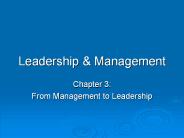Leadership - PowerPoint PPT Presentation
1 / 22
Title:
Leadership
Description:
'The Columbia Broadcasting System and its affiliated stations present Orson Wells ... DEFINITIONS are all that should be written down verbatim. Remembering ... – PowerPoint PPT presentation
Number of Views:48
Avg rating:3.0/5.0
Title: Leadership
1
Leadership
- Listening Effectively
2
800 pm 30 October, 1938
- The Columbia Broadcasting System and its
affiliated stations present Orson Wells and the
Mercury Theater of the Air in The War of the
Worlds by H.G. Wells - This announcement played twice during the
presentation - At least 1/6th of the listeners did not listen,
they only heard the words.
3
Getting Ready to Listen
- Prepare Mentally and Physically
- Put away distracting stuff like cell phones,
extra pencils, etc. - Think about the subject and what your experience
with the subject has been
4
Take Responsibility to Comprehend
- Concentration -
5
Take Responsibility to Comprehend
- Concentration Close mental application,
exclusive attention. - Think about your own experiences that illustrate
the speakers point. - Mentally apply the point too your own situation.
- Rephrase the speakers examples.
- This will help you understand and remember the
speakers points
6
Attending
- Attending -
7
Attending
- Attending being mentally alert to the other
person. - Good attending means no physical distractions.
- Let the other person know you are giving your
full and undivided attention. - This shows you are interested and you care.
8
Comprehending
- Comprehending understanding what is said
9
Comprehending
- Comprehending understanding what is said
- Receptive you understand the literal meaning of
what is said
10
Comprehending
- Comprehending understanding what is said
- Reflective you are able to catch the full
meaning of what the speaker is saying. Reflective
listening requires - Paraphrasing
- Checking perceptions
- Withholding judgment
11
Comprehending
- Comprehending understanding what is said
- Reflective you are able to catch the full
meaning of what the speaker is saying. Reflective
listening requires - Paraphrasing put it in your own words
- Checking perceptions
- Withholding judgment
12
Comprehending
- Comprehending understanding what is said
- Reflective you are able to catch the full
meaning of what the speaker is saying. Reflective
listening requires - Paraphrasing put it in your own words
- Checking perceptions use I messages
- Withholding judgment do not interrupt or snap
decisions based on incomplete information. Get
all of the facts before offering an opinion.
13
Listen to understand not argue
- Analyze what the speaker is saying, but to not
argue with the speaker. - Critical listening is necessary for making
informed, intelligent decisions.
14
Control Your Emotions!!!!!!!
- ? ? -D
- Dont build barriers between you and the speaker.
- Barriers can force you to react to the speakers
ideas rather than just their words.
15
Listening for Main Ideas
- Make a mental picture of what the speaker is
saying. - You can benefit from the research, experience,
and thinking of speakers who are knowledgeable in
many fields.
16
Be Mentally Agile
- Concentrating is a challenge
- You are likely to think faster than the person
can speak - This gives you the chance to review what was
said. - You have time to repeat, mentally, summarize and
paraphrase the speakers remarks. - This increases your comprehension and memory!
17
Taking Notes
- We take notes because we do not trust our
memories. - Dont try to write so much you cant keep up with
what the speaker is saying.
18
Taking Notes
- We take notes because we do not trust our
memories. - Dont try to write so much you cant keep up with
what the speaker is saying. - Be in place and ready before the lecture starts.
19
Taking Notes
- We take notes because we do not trust our
memories. - Dont try to write so much you cant keep up with
what the speaker is saying. - Be in place and ready before the lecture starts.
- Use abbreviations and key words instead of full
sentences
20
Taking Notes
- We take notes because we do not trust our
memories. - Dont try to write so much you cant keep up with
what the speaker is saying. - Be in place and ready before the lecture starts.
- Use abbreviations and key words instead of full
sentences - Include the main idea and enough supporting ideas
to be clear.
21
Taking Notes
- We take notes because we do not trust our
memories. - Dont try to write so much you cant keep up with
what the speaker is saying. - Be in place and ready before the lecture starts.
- Use abbreviations and key words instead of full
sentences - Include the main idea and enough supporting ideas
to be clear. - DEFINITIONS are all that should be written down
verbatim
22
Remembering
- How interesting the information isis critical.
- Being a mature and objective listener means you
can appreciate what is said no matter how strong
your interest is in the subject.































